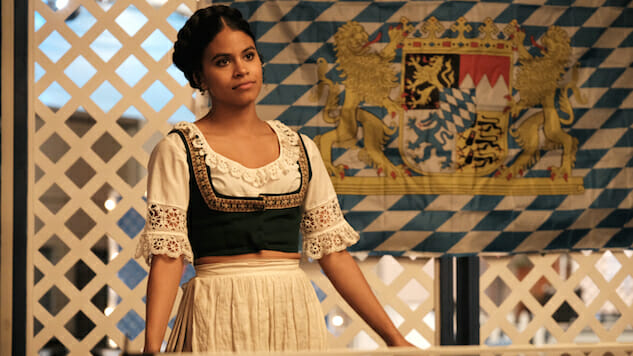Atlanta: Zazie Beetz Delivers a Star Turn in the Gut-Punch That Is “Helen”
(Episode 2.04)
Photo: Guy D'Alema/FX
No matter how much things change in Atlanta, the same problems persist. It’s the high-level injustice of structural prejudice mirrored in the personal problems of those affected. Cycles are inescapable, no matter how small and specific they may seem. Here, in “Helen,” it all takes place in a different setting than we’re used to seeing in the series: The Fasnacht Day celebration of Helen, Georgia.
The German festival is an externalization of the complex relationship between Van (Zazie Beetz) and Earn (creator Donald Glover). They started the series as friends with a shared child, hooking up from time to time but decidedly apart. Now, especially considering last week’s stunting solidarity, things between the two seemed more stable than ever. There’s a closeness between them that’s developed over the course of the series, beginning with the solid foundation of mutual understanding and blossoming into something more monogamous. “Helen” opens with Earn eating Van out—a televisual rarity that speaks to sexual obligation and stereotypes of male sexual selflessness, even if he lacks the tongue confidence he gains after a joint or two—and ends with the cold practicality of people with nothing but obligation between them.
That the episode handles this transition smoothly is thanks to director Amy Seimetz, whose handling of Beetz and Glover is just as surgical as her shot choices, and an astonishingly dense script. That script, written by Taofik Kolade and dense not with wordplay (though there’s plenty) but with layers of meaning, makes intense, hilarious culture shock a bitter catalyst for a relationship’s deterioration.
Fasnacht is weird. Traditional. An anomaly when compared to the strip clubs and hookah bars of “Money Bag Shawty.” There are complicated German games, dancing competitions, and a sea of white faces. (So white that someone approaches Earn thinking he’s in really good blackface.) And, as the episode goes on and people’s authentic blackness is called into question, this accusation becomes complicated. Sidebar: there’s a discussion between Van and her high school friend about black female identity and how it relates to (1) men (2) children, and (3) the race of both. It cuts like an executioner’s axe—not funny or particularly exciting, just brutally efficient.
For now, these encounters simple rub in how crazy the fest is.
-

-

-

-

-

-

-

-

-

-

-

-

-

-

-

-

-

-

-

-

-

-

-

-

-

-

-

-

-

-

-

-

-

-

-

-

-

-

-

-








































